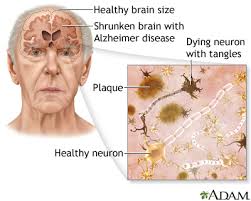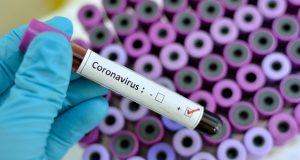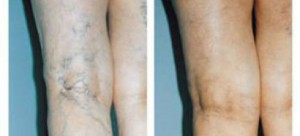You are more likely to develop AD if you:
 Are older. Developing AD is not a part of normal aging.
Are older. Developing AD is not a part of normal aging.
Have a close relative, such as a brother, sister, or parent with AD.
Have certain genes linked to AD.
Symptoms
AD symptoms include difficulty with many areas of mental function, including:
Emotional behavior or personality
Language
Memory
Perception
Thinking and judgment (cognitive skills)
AD usually first appears as forgetfulness.
Mild cognitive impairment (MCI) is the stage between normal forgetfulness due to aging, and the development of AD. People with MCI have mild problems with thinking and memory that do not interfere with daily activities. They are often aware of the forgetfulness. Not everyone with MCI develops AD.
Symptoms of MCI include:
Difficulty performing more than one task at a time
Difficulty solving problems
Forgetting recent events or conversations
Taking longer to perform more difficult activities
Early symptoms of AD can include:
Difficulty performing tasks that take some thought, but used to come easily, such as balancing a checkbook, playing complex games (bridge), and learning new information or routines
Getting lost on familiar routes
Language problems, such as trouble remembering the names of familiar objects
Losing interest in things previously enjoyed and being in a flat mood
Misplacing items
Personality changes and loss of social skills
As AD becomes worse, symptoms are more obvious and interfere with the ability to take care of oneself. Symptoms may include:
Change in sleep patterns, often waking up at night
Delusions, depression, and agitation
Difficulty doing basic tasks, such as preparing meals, choosing proper clothing, and driving
Difficulty reading or writing
Forgetting details about current events
Forgetting events in one’s life history and losing self-awareness
Hallucinations, arguments, striking out, and violent behavior
Poor judgment and loss of ability to recognize danger
Using the wrong word, mispronouncing words, or speaking in confusing sentences
Withdrawing from social contact
People with severe AD can no longer:
Recognize family members
Perform basic activities of daily living, such as eating, dressing, and bathing
Understand language
Other symptoms that may occur with AD:
Problems controlling bowel movements or urine
Swallowing problems
Exams and Tests
A skilled health care provider can often diagnose AD with the following steps:
Performing a complete physical exam, including a nervous system exam
Asking about the person’s medical history and symptoms
Mental function tests (mental status examination)
A diagnosis of AD is made when certain symptoms are present, and by making sure other causes of dementia are not present.
Tests may be done to rule out other possible causes of dementia, including:
Anemia
Brain tumor
Chronic infection
Intoxication from medicines
Severe depression
Increased fluid on the brain (normal pressure hydrocephalus)
Stroke
Thyroid disease
Vitamin deficiency
CT or MRI of the brain may be done to look for other causes of dementia, such as a brain tumor or stroke. Sometimes, a PET scan can be used to rule out AD.
The only way to know for certain that someone has AD is to examine a sample of their brain tissue after death.
Treatment
There is no cure for AD. The goals of treatment are:
Slow the progression of the disease (although this is difficult to do)
Manage symptoms, such as behavior problems, confusion, and sleep problems
Change the home environment to make daily activities easier
Support family members and other caregivers
Medicines are used to:
Slow the rate at which symptoms worsen, though the benefit from using these drugs may be small
Control problems with behavior, such as loss of judgment or confusion
Before using these medicines, ask the provider:
What are the side effects? Is the medicine worth the risk?
When is the best time, if any, to use these medicines?
Do medicines for other health problems need to be changed or stopped?
Someone with AD will need support in the home as the disease gets worse. Family members or other caregivers can help by helping the person cope with memory loss and behavior and sleep problems. It is important to make sure the home of a person who has AD is safe for them.
send us email to [email protected] about complete instructions how to make and use some home remedy.
Medical Disclaimer
The Content is not intended to be a substitute for professional medical advice, diagnosis, or treatment. Always seek the advice of your physician or other qualified health provider with any questions you may have regarding a medical condition. Never disregard professional medical advice or delay in seeking it because of something you have read on this Website.
 EN.BabinLEK Cure yourself
EN.BabinLEK Cure yourself



